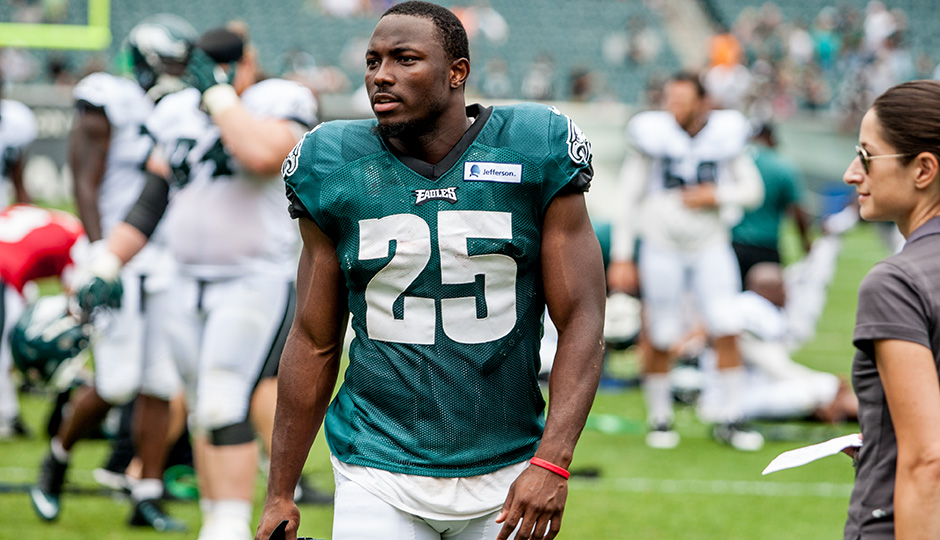Afternoon Notes: McCoy Misquoted? Still No Warrant

Photo by: Jeff Fusco.
What offseason? We put together a collection of some intriguing afternoon notables, including a few notes on former Eagles running back LeSean McCoy.
CSN Philadelphia’s John Gonzalez brings an update on the McCoy situation, which is moving slowly for now.
As of Thursday morning, no decision had been made on possible arrest warrants for LeSean McCoy and three other men, according to law enforcement officials.
“The [district attorney’s] office is moving slowly for a reason,” a source told CSNPhilly.com “This can’t be rushed.”
One law enforcement official said it could be late Thursday or Friday before warrants are issued.
McCoy and three associates — former NFL running back Curtis Brinkley, former Pitt football player Tamarcus Porter and a friend, Christopher Henderson — are under investigation for their alleged involvement in a brawl with three off-duty police officers at Recess Lounge in Old City over the weekend. Two of the officers ended up in the hospital with various injuries including broken ribs, a broken nose, and a possible skull fracture.
McCoy’s side says he was misquoted by PhillyInfluencer.com, who talked to him briefly outside of Misconduct Tavern on Wednesday night.
Sources from McCoy’s camp are claiming Shady said he would make a “statement” instead of saying he had made a “mistake.”
From FOX Sports’ Alex Marvez, Chip Kelly is building the 49ers in the image of his Eagles teams.
Under Chip Kelly, San Francisco’s coaching staff has become Eagles West.
A source told FOXSports.com that former Eagles assistant linebackers coach Brian Smith will join the 49ers as a defensive assistant.
Smith’s hiring now makes six staff members who have followed Kelly from Philadelphia to the 49ers. The others are Bob Bicknell (wide receivers), Ryan Day (quarterbacks), Jerry Azzinaro (defensive line), Michael Clay (assistant special teams) and J.P. Crowley Hanlon (assistant to the coaching staff).
The 49ers must hope the group enjoys more success than last year in Philadelphia where the Eagles went 7-9, which led to Kelly’s firing as head coach with one week left in the season.
From PFT’s Mike Florio, Gary Myers of the New York Daily News suggested Terrell Owens was blocked from the Hall of Fame because he was disruptive, and Florio had opinions.
The notion that “five teams couldn’t wait to get rid of” Owens simply isn’t true. In San Francisco, he became a free agent and elected to leave. In Philadelphia, the Eagles decided to cut him only after Owens decided he was going to force his way out because the Eagles wouldn’t renegotiate his contract following a stellar 2004 season.
Besides, not all voters agree with Myers. Per a source with knowledge of the situation, it’s inaccurate to conclude that the entire room accepted the idea that Owens’ on-field achievements should be ignored because of the fact that Owens played for multiple teams and/or had a reputation for being a pain in the butt.
That’s not to say Owens wasn’t actually a pain in the butt. He may have been. But enough voters apparently felt strongly enough that Owens shouldn’t get in on his first try, and that [Marvin] Harrison (whose own candidacy possibly was delayed once or twice by troubling evidence regarding multiple Philadelphia shootings that never resulted in an arrest or prosecution) deserved to get in now.
Not Eagles-related, but ESPN’s Don Van Natta Jr. and Seth Wickersham put together an incredible behind-the-scenes piece on the NFL’s return to Los Angeles.
One NFL owner called the meeting a “s— show.” A “nightmare,” another said. Yet another described it as “the most contentious and polarizing” in decades. On Dec. 2 at the Four Seasons in Irving, Texas, the owners-only meeting had a single agenda item: Which team or teams should be allowed to relocate to Los Angeles?
The inability of America’s most popular sport to occupy the nation’s second-largest market since the Rams and Raiders left after the 1994 season had become a running joke. In the past two decades, at least 20 Los Angeles stadium proposals had been designed and junked. An expansion team had been awarded to LA in 1999 but then, mired in red tape, sent to Houston to become the Texans. Many clubs had used the threat of moving to Los Angeles as leverage to build new, publicly financed stadiums. But now, the idea of at least one franchise relocating to LA wasn’t just a fanciful notion. It was real.